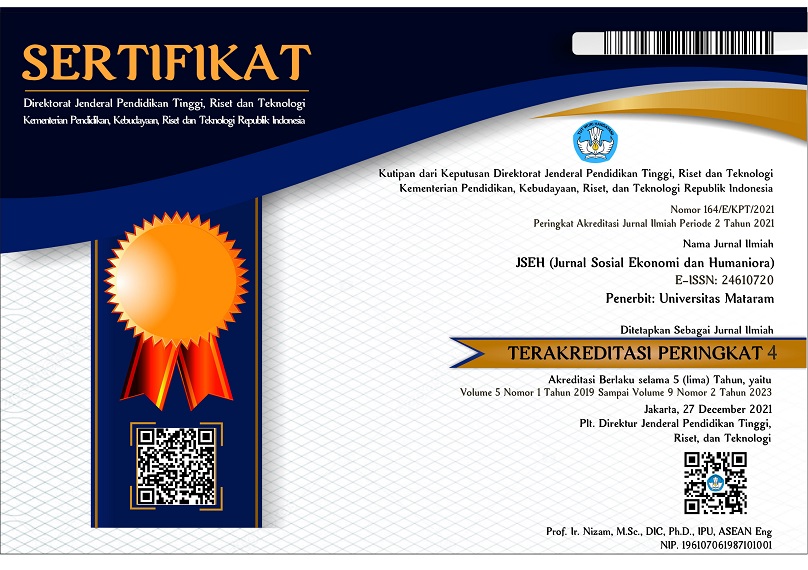Apakah Religiusitas sebagai Faktor Penarik Terhadap Kepuasan Nasabah (Studi Kasus BMT Idrisiyyah Tasikmalaya)
Keywords:
service, reliability, responsiveness, tangible, assurance, empathy religiosity, customer satisfactionAbstract
The purpose of this study is to know and analyze the implementation of services, perceptions of religiosity of institutions and customer satisfaction, as well as the influence of service quality and religiosity perceptions in BMT Idrisiyyah to customer satisfaction BMT Idrisiyyah Tasikmalaya.The research method used in this research is the field research method (field reaserch), while the data collection techniques are done through the spread of questionnaires and interviews. The sampling technique using slovin formula with the number of respondents 100 customers and the analysis tools used are classical assumption test, multiple linear regression analysis, coefficient of determination test, t-test and F test.Based on the results of research and F-test results (simultaneous) showed that service and perceptions of religiosity together affect the customer satisfaction. The result of t-test (partial) which have positive effect significantly to customer satisfaction from service quality is variable of reliability, responsiveness variable, assurance variable and empathy while for physical proof (tangible) has no effect to customer satisfaction. For the perception variable religiosity also does not affect customer satisfaction. For the mutual influence of service quality and religiosity perception have an effect on customer satisfaction in BMT Idrsiyyah with significance value 0,000 and F value equal to 6,750.
References
Alaan, Y. (2016). Pengaruh Service Quality (Tangible, Empathy, Reliability, Responsiveness dan Assurance) terhadap Customer Satisfaction: Penelitian pada Hotel Serela Bandung. Jurnal Manajemen Maranatha, 15(2).
Ali, H., & Miftahurrohman, M. (2016). Determinan yang Mempengaruhi Pembiayaan Murabahah Pada Perbankan Syariah di Indonesia. Esensi: Jurnal Bisnis Dan Manajemen, 6(1), 31–44.
Ali, M. M., & Ascarya, I. (2014). Analisis Efisiensi Baitul Maal Wat Tamwil Dengan Pendekatan Two Stage Data Envelopment Analysis (Studi Kasus Kantor Cabang BMT MMU Dan BMT UGT Sidogiri). Tazkia Islamic Finance and Business Review, 5(2).
Antonio, M. S. (2001). Bank Syariah: dari teori ke praktik. Gema Insani.
Bawono, A. (2011). Kontribusi Religiusitas dalam Perilaku Pengambilan Keputusan Konsumsi. Muqtasid: Jurnal Ekonomi Dan Perbankan Syariah, 2(1), 115–133.
Fornell, C., & Westbrook, R. A. (1984). The vicious circle of consumer complaints. Journal of Marketing, 48(3), 68–78.
Gauthier, F. (2016). Religion in consumer society: brands, consumers and markets. Routledge.
Hidayat, F. (2016). Alternative Sistem Pengawasan pada Koperasi Simpan Pinjam dan Pembiayaan Syariah (KSPPS) dalam Mewujudkan Shariah Compliance. Jurnal Mahkamah: Kajian Ilmu Hukum Dan Hukum Islam, 1(2), 383–407.
Iskamto, D., & YULIHARDI, Y. (2017). Analisis peranan religiusitas terhadap kepercayaan kepada perbankan syariah. Maqdis: Jurnal Kajian Ekonomi Islam, 2(2), 205–214.
Kotler, P., & Keller, K. L. (2013). Manajemen Pemasaran, Jilid Kedua. Jakarta: Erlangga.
Lewis, M. K., & Algaoud, L. M. (2003). Perbankan Syariah: prinsip, pratik, dan prospek. Serambi Ilmu Semesta.
Mardani, D. A. (2019). Spritual Entepreneurship Dalam Pemberdayaan Ekonomi Umat: Studi Terhadap Tarekat Idrisiyah Pageningan Tasikmalaya. Al-Afkar, Journal for Islamic Studies, 2(2, July), 194–206.
McDaniel, S. W., & Burnett, J. J. (1990). Consumer religiosity and retail store evaluative criteria. Journal of the Academy of Marketing Science, 18(2), 101–112. https://doi.org/10.1007/BF02726426
Otoritas Jasa Keuangan. (2018). Statistika Perbankan Syariah 2018. (D. P. dan I. Perbankan, Ed.). Jakarta: OJK. Retrieved from www.ojk.go.id
Prihandono, A. P. P. (2017). Analisis pengaruh pengetahuan, religiusitas dan motif rasional terhadap proses keputusan dosen menggunakan Bank Syariah (studi kasus pada dosen di UIN Syarif Hidayatullah Jakarta). UIN Syarif Hidayatullah Jakarta: Fakultas Ekonomi dan Bisnis, 2017.
Pujihastuti, I. (2010). Prinsip Penulisan Kuesioner Penelitian. CEFARS: Jurnal Agribisnis Dan Pengembangan Wilayah, 2(1), 43–56.
Soendari, T. (2012). Metode Penelitian Deskriptif. Online) Https://Academia. Edu/Jurnal-Metode-Penelitian-Deskriptifpdf. Html (Diakses 15 Juni 2017).
Syed, S. A. (2011). Is religiosity an important determinant on Muslim consumer behaviour in Malaysia? Journal of Islamic Marketing, 2(1), 83–96. https://doi.org/10.1108/17590831111115268
Yahya, M., & Agunggunanto, E. Y. (2011). Teori Bagi Hasil (profit and Loss Sharing) dan perbankan syariah dalam ekonomi syariah. Jurnal Dinamika Ekonomi Pembangunan, 1(1), 1–83.
Yoiz Shofwa, S. (2015). Pengaruh Kualitas Produk Dan Religiusitas Terhadap Keputusan Nasabah Produk Simpanan Pada BSM Cabang Purwokerto.
Zeithaml, V. A. (n.d.). dan Mary Jo Bitner. 2003. Services Marketing: Integrating Customer Focus Across the Firm. New York: McGraw-Hill Companies, Inc.
Zeithaml, V. A., Berry, L. L., & Parasuraman, A. (1993). The nature and determinants of customer expectations of service. Journal of the Academy of Marketing Science, 21(1), 1–12.
Zen, I. (2017). Kemandirian Fungsi Ojk Dalam Pengaturan Dan Pengawasan Perjanjian Kredit Perbankan Yang Melindungi Para Pihak (Uu Ri Nomor 21 Tahun 2011 Tentang Otorisasi Jasa Keuangan). Universitas Brawijaya.
Downloads
Published
How to Cite
Issue
Section
License

This work is licensed under a Creative Commons Attribution-NonCommercial 4.0 International License.








